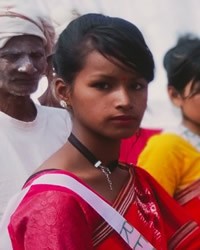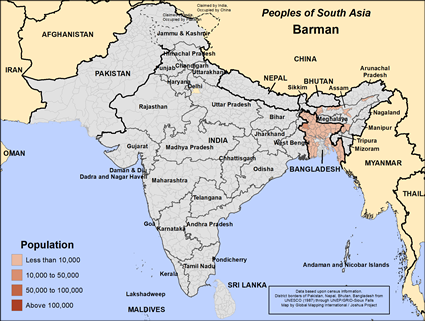The Barman or Barman Kachari are a small group of indigenous people who live in northeast India. Their main occupation is agriculture.
The Barman officially became Hindus the in 18th century converting from their ethnic religion. In 1826, the area of Assam where the Barman live came under British control. At the time of the Partition in 1947, the Barman who lived in what is now Bangladesh migrated to Assam. The Barman are classified as a Scheduled Tribe, which means they are eligible for public jobs and special consideration for university admissions. Unfortunately, the illiteracy rate of the Barman is estimated to be 97%.
The main language of the Barman is Dimasa. Some also speak Assamese so they can communicate with outsiders. Some Christian resources are available in Dimasa including the New Testament and the JESUS Film.
The Barman live in the northeastern Indian state of Assam.
Many Barman work as sharecroppers on others' land. Sharecroppers get a small percentage of the produce while the rest goes to the landowner.
The Barman grow rice, wheat, vegetables, beans, mustard, potatoes, mangos, betel nut, and coconuts. Betel nut is a mild stimulant used in south Asia. Besides farming, some Barda men work in the construction trades and logging.
The Barman marry within their group but not within their particular clan. Families arrange marriages. The newly married couples often live with or near the groom's parents.
Each Barman village has a chief or matbar. He settles legal disputes and no community activity can take place without his permission.
The Barman have their traditional costumes, music and dances, which they employ during holiday and family ceremonies. The Barman perform a dance called meshak during festivals and holidays.
The Barman make and sell bamboo items for cash. These include pipes for smoking, fishing poles, mats, and furniture.
The Barman practice a form of Hinduism that is heavily influenced by folk religion. They worship and serve the gods of the Hindu pantheon. Hindus believe that by performing rituals and good works that they will attain moksha or freedom from the endless cycle of birth, death and rebirth. The Barman visit Hindu shrines and offer prayers, food, flowers, and incense to their gods in hopes of gaining protection and benefits. They do not have a personal or familial relationship with their gods like Christians or Jews. There are many forms of Hinduism, each with its own deities and beliefs.
The main yearly holidays of the Barman people are Holi, the festival of colors and the start of spring, Diwali, the festival of lights, Navratri, the celebration of autumn and Rama Navami, Rama's birthday. The Barman also worship their tribal deities and have their own holidays.
The Barman believe that evil spirits inhabit the forces of nature. These spirits and ancestors must be appeased through offering, rituals and prayers.
Solar panels can bring electricity to Barman villages. The Barman need help in educating their children. The adults need to learn how to read and write so they can better participate in India's economy. The Barman would benefit with access to modern medicine. Most of all, the Barman need to hear and understand the message of Jesus Christ. He alone can forgive their sins and get them right with the one, true God.
Pray that a strong movement to Jesus will bring whole Barman families and communities into a rich experience of God's blessings.
Pray for Barman families and communities to discover and embrace the free gift of life found by trusting Christ and His finished work.
Pray that God will overthrow spiritual forces of darkness opposing the spread of His gospel in the Barman community.
Scripture Prayers for the Barman in India.
https://en.wikipedia.org/wiki/Barman_Kacharis
https://en.wikipedia.org/wiki/Prayas_Ray_Barman
| Profile Source: Keith Carey |











